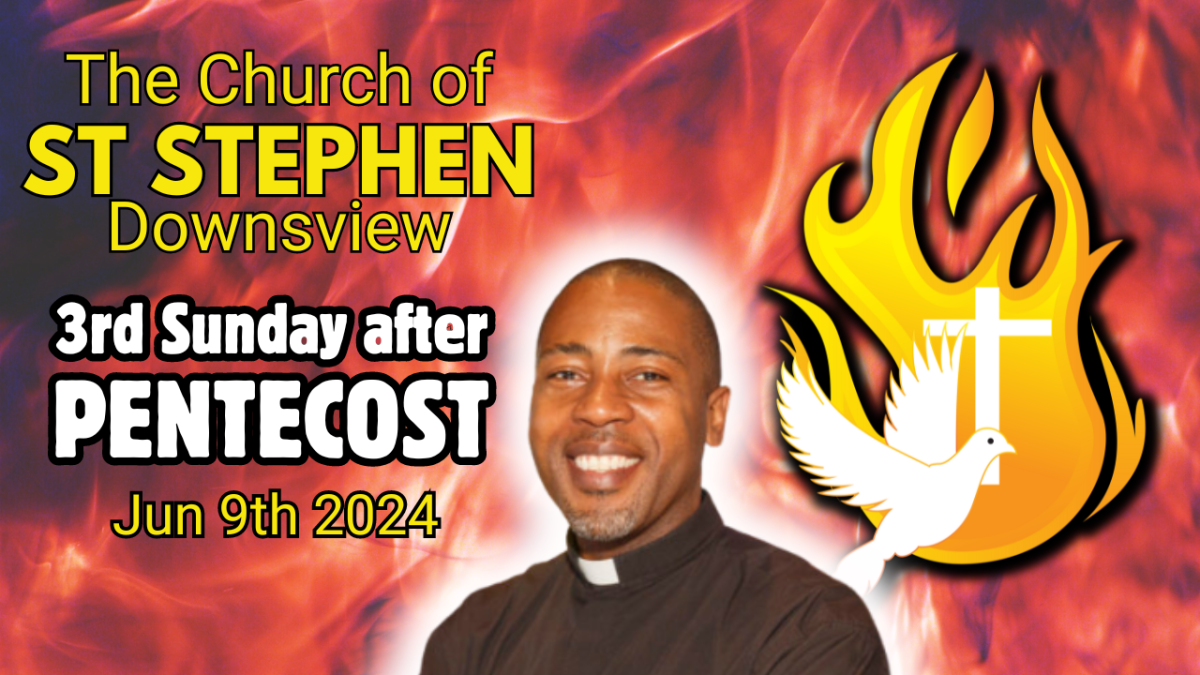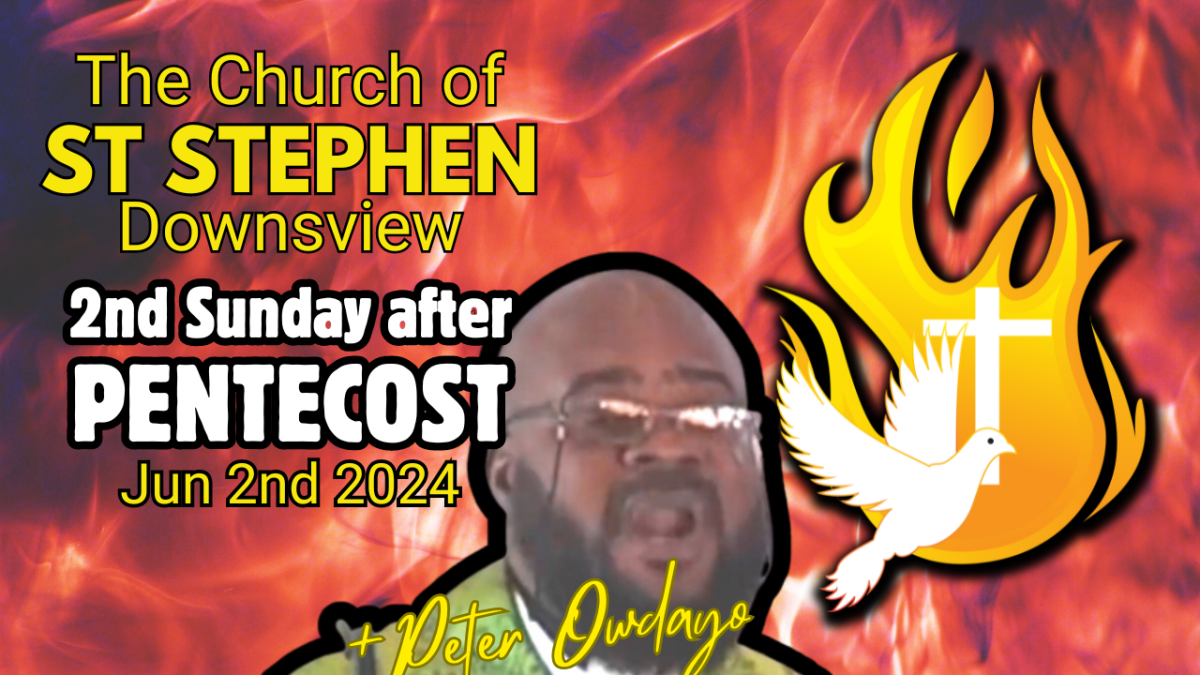Archive for June, 2024
Posted on: June 30th, 2024 by St. Stephens Downsview
 Everyone good? Today, I’d like to share some reflections from Mark’s Gospel, Chapter Five, verses 22 to 24. This passage introduces us to Jairus, one of the leaders of the synagogue. Jairus came to Jesus, fell at His feet, and begged repeatedly, “My little daughter is at the point of death. Come and lay your hands on her so that she may be made well and live.” Moved by his plea, Jesus went with him.
Everyone good? Today, I’d like to share some reflections from Mark’s Gospel, Chapter Five, verses 22 to 24. This passage introduces us to Jairus, one of the leaders of the synagogue. Jairus came to Jesus, fell at His feet, and begged repeatedly, “My little daughter is at the point of death. Come and lay your hands on her so that she may be made well and live.” Moved by his plea, Jesus went with him.
The Journey from Fear to Faith
We often encounter fear of the unknown, fear of others’ opinions, and fear of change. These fears can overwhelm us, particularly when we are praying for something we desperately need. Just last Sunday, we heard in the Gospel reading about the disciples’ fear during a powerful storm at sea, with Jesus asleep in the boat. Mark’s account, I believe, is not random but carefully placed to highlight a transformation from fear to faith.
In the midst of that storm, the disciples were terrified. When Jesus woke and calmed the storm, the disciples asked, “Who then is this, that even the wind and the waves obey him?” This question captured their ignorance, confusion, and the beginning of their understanding. It opened a pathway to deeper faith.
Embracing Christian Discipleship
Our Christian journey is fraught with uncertainties. We are bound to face situations where we feel unsure and afraid. How do we navigate the space between fear and faith? Jairus faced this predicament as his daughter lay dying. He risked his reputation and sought out Jesus amid a crowd clamoring for His attention. Despite his fears, Jairus begged Jesus repeatedly, demonstrating his readiness to shed any pretense.
Jesus responded without hesitation, following Jairus to his home. Upon arrival, Jesus took Jairus’s daughter by the hand and said, “Talitha koum,” meaning “Little girl, get up.” Immediately, she got up and started walking as if nothing was ever wrong. Jesus told Jairus, “Do not fear, only believe.”
Confronting Our Own Fears
We are often held back from reaching out to God due to our fears and misconceptions. We might feel our concerns are less pressing than others or consider ourselves unworthy. These fears mirror those of the woman suffering from hemorrhages for twelve years. By Jewish law, her touch would make others ceremonially unclean. Yet, in her desperation and faith, she touched Jesus’s clothes, believing she would be healed.
The Miraculous Power of Faith
This woman’s touch became her channel for healing. She acted on her faith, despite her fears. Like Jairus and this woman, we are called to have faith in Jesus’s presence among us. This faith draws us out from the dark places in our lives, from following the crowd, and from merely being admirers of Jesus. It pulls us into a deeper, more committed discipleship.
Jesus calls us away from our fears and into faith, much like He did the disciples who were hiding in fear before Pentecost. In the upper room, they were transformed by God’s presence, transitioning from fear to bold, public proclamation of their faith.
The Light of Christ in Our Lives
Every day, in morning prayer, we recite the Benedictus, declaring, “In the tender compassion of our God, the dawn from on high shall break upon us to shine upon those who dwell in darkness and the shadow of death and to guide our feet into the way of peace.”
The shadow of death doesn’t just mean physical death; it symbolizes all the areas we try to shield from God’s light. It’s like a solar eclipse that temporarily blocks the sun’s light. Christ’s light, however, penetrates even these dark corners, leading us into peace.
Keeping Our Eyes on Jesus
As Jesus guided Jairus through his fears, He guides us too. By focusing our faith on Him, we learn to navigate the space between fear and faith. Jesus’s words resonate deeply: “Do not fear. Just believe.”
In this journey, let’s keep our eyes trained on Jesus. It is only through Him that we can transform our fears into unwavering faith.
Amen.
Posted on: June 16th, 2024 by St. Stephens Downsview
 As I reflect on my own Christian journey, and on the nature of the Christian journey more broadly, I am continually reminded of how closely our response to Jesus’s call mirrors Abraham’s response to God’s call in Genesis 12. God said to Abraham, “Go from your country, your people and your father’s household to the land I will show you. I will make you into a great nation, and I will bless you; I will make your name great, and you will be a blessing.”
As I reflect on my own Christian journey, and on the nature of the Christian journey more broadly, I am continually reminded of how closely our response to Jesus’s call mirrors Abraham’s response to God’s call in Genesis 12. God said to Abraham, “Go from your country, your people and your father’s household to the land I will show you. I will make you into a great nation, and I will bless you; I will make your name great, and you will be a blessing.”
Just as God called Abraham into an unimaginable future, our Christian journey begins with a call from God. Though the destination is unknown, the journey is marked by God’s assurance and promises. Abraham’s journey was one of faith, walking by faith and not by sight, trusting that God would fulfill His promises.
A Call and A Promise
Abraham’s call was not solely about him, but about God’s purposes for His kingdom. God promised to bless Abraham and make him a great nation, not for Abraham’s sake alone, but so that he could be a blessing to others. Similarly, our journey of faith is not only for ourselves but for God’s greater purposes. Abraham’s unknown destination underscores the necessity of trust in God’s promises.
In our faith journey, the greatness to which God calls us often begins with small acts of obedience and faith. Jesus teaches this through two parables about the kingdom of God. The first likens the kingdom to a man who scatters seed, which grows independently. This parable emphasizes that the growth of God’s kingdom does not depend on our power but on God’s inherent rhythm within creation.
The Seed and Its Growth
The growth of the kingdom is a divine process. We sow, but it is God who brings the harvest. This dependable rhythm in creation assures us that our efforts are part of something much greater, ultimately under God’s control.
In the second parable, Jesus compares the kingdom to a mustard seed – the smallest of all seeds – that grows into the largest of garden plants. This demonstrates that while the kingdom of God may start small, it grows beyond our imagination, providing rest for many. Our faithfulness in small things is crucial, as it is through such seemingly insignificant beginnings that God unfolds His kingdom.
God’s Unseen Hand
This pattern of small beginnings leading to grand outcomes is evident throughout the Bible. David, the youngest and most insignificant of Jesse’s sons, is chosen by God to establish His kingdom. Despite human opposition, God’s purpose prevails, manifesting His faithfulness in unexpected ways.
Similarly, Jesus, born in humble circumstances, was dismissed by many as the Messiah because of His modest origins. Yet, in Him, God’s promise of salvation becomes reality. This same pattern repeats in the lives of His disciples, many of whom were ordinary, uneducated fishermen. Their faithfulness and obedience, like the mustard seed, led to the growth of the kingdom, impacting generations.
Our Role in God’s Kingdom
Today, as we gather here at St. Stephen, we must ask ourselves if we recognize God’s work in our midst. Are we discerning His faithfulness over time, bringing His kingdom into being from humble beginnings?
St. Paul reminds us not to view others from a merely human perspective. We are all unfinished works of a loving and gracious God. The seed of God’s word planted in our hearts will bear fruit in its time.
Faith calls us to trust in God’s dependability to bring us exactly where we need to be. We may not understand when or how our prayers and efforts will bear fruit, but we can trust that God is faithful. He will complete the good work He has begun in us.
A New Creation in Christ
Paul proclaims, “If anyone is in Christ, there is a new creation; everything old has passed away; see, everything has become new.” This transformation may not be immediately apparent to the natural eye, but it is real and instantaneous. Living in this new creation, we no longer live for ourselves but for Christ.
In Him, our lives, though they may begin like tiny mustard seeds, will grow to provide rest and refuge for many. Like Abraham, we are called to journey in faith, trusting in God to open up new futures before us.
May God grant us the eyes to see, the ears to hear, and the strength and courage to trust in His faithfulness, following Him wherever He leads.
Amen.
Posted on: June 9th, 2024 by St. Stephens Downsview
 Some words from Mark’s Gospel chapter 3, reading from verses 33 to 35: Jesus asked, “Who are my mother and my brothers?” And looking at those who sat around Him, He said, “Here are My mother and My brothers. Whoever does the will of God is My brother and sister and mother.” Last Monday afternoon, I was listening to a news report by a local broadcaster. The report seemed to lead up to the 80th celebration of D-Day, which had just been observed the previous Thursday, June 6th. D-Day marked the beginning of the end of World War II, as Allied troops landed in Normandy, France. The broadcast, sadly, chronicled the rise of the far right, especially among the younger generation. This new wave of far-right sentiment carried with it many of the old ideologies of the Nazi regime, instigating a rise in anti-immigrant and anti-Semitic sentiment across Germany and beyond.
Some words from Mark’s Gospel chapter 3, reading from verses 33 to 35: Jesus asked, “Who are my mother and my brothers?” And looking at those who sat around Him, He said, “Here are My mother and My brothers. Whoever does the will of God is My brother and sister and mother.” Last Monday afternoon, I was listening to a news report by a local broadcaster. The report seemed to lead up to the 80th celebration of D-Day, which had just been observed the previous Thursday, June 6th. D-Day marked the beginning of the end of World War II, as Allied troops landed in Normandy, France. The broadcast, sadly, chronicled the rise of the far right, especially among the younger generation. This new wave of far-right sentiment carried with it many of the old ideologies of the Nazi regime, instigating a rise in anti-immigrant and anti-Semitic sentiment across Germany and beyond.
The Rise of Divisive Ideologies
These young people have adopted an insidious nationalist refrain: “Germany for the Germans.” They frame this ideology as mere national pride, but we know too well where such divisive thinking leads. Similar tendencies towards increased conservatism and nationalism have emerged worldwide, especially in the post-pandemic era. There’s an observable shift in public ideology towards greater authoritarianism and a pervasive sentiment of “us vs. them.” In our increasingly polarized world, we see this not just in politics but also within our religious communities, on social media, and in cultural and ethnic relations. The pandemic’s enforced isolation seems to have exacerbated this divide, leading us to label others in dehumanizing ways. Once we label others as “the other,” we tacitly grant ourselves permission to treat them as less than human.
Embracing Labels Over God’s Sovereignty
This isn’t a new problem. The Israelites in 1 Samuel requested a king to govern over them, like other nations, despite God’s warnings. They rejected their divine privilege, yearning instead for earthly rulers who ultimately oppressed them. Similarly, today’s labels—conservative, liberal, immigrant, native—become our masters, overshadowing our true identity in God. **Christ’s Unifying Message** The Gospel of Mark tells us about Jesus’ ministry, filled with miraculous healings and proclamations of God’s kingdom. Despite these miracles, Jesus was often labeled negatively—out of His mind, demon-possessed. Such labels aimed to undermine His divine mission and discredit Him in the eyes of the people. When truth and goodness are labeled as madness or evil, it’s a strategy to maintain the status quo and resist transformative change. Jesus’ teachings demonstrate that labels are ultimately meaningless in God’s kingdom. His actions—freeing the oppressed and healing the suffering—reveal the truth: “If the Son has set you free, you are free indeed.” Our connection to Christ is based on faith, expressed through obedience to God’s will.
Living Free from Labels
As children of God, our identities transcend societal labels. I am more profoundly a child of God and a joint heir with Christ than any label—be it my ethnicity, nationality, or social status. This is the liberating message of the Gospel. Such labels are often the cause of division and conflict, as they justify treating others as less worthy. Anglican Bishop N.T. Wright emphasizes that the church must always prioritize loyalty to Jesus over any earthly identity. Our communal life, rooted in Christ, proclaims the Gospel to the world, showcasing unity amid diversity.
Conclusion
May we seek not other lords or labels to define us but remember that we are first and foremost children of the living God. This recognition calls us to new levels of unity, transcending the human categories that divide us.
Let Us Pray
Oh, Lord, unlike earthly kings, You are ever steadfast and faithful. You send us Your Son, Jesus the Christ, to rule over us not as a tyrant but as a gentle shepherd. Keep us united and strong in this faith, that we may always know Your presence in our lives. And when You call us home, may we enter Your heavenly kingdom where You live and reign forever and ever. Amen.
Posted on: June 2nd, 2024 by St. Stephens Downsview
 As I reflect on this morning’s scripture, I am reminded of the profoundness and significance of hearing the voice of God. By God’s grace, today we shall delve into understanding how we can hear from God, both individually and as a church.
As I reflect on this morning’s scripture, I am reminded of the profoundness and significance of hearing the voice of God. By God’s grace, today we shall delve into understanding how we can hear from God, both individually and as a church.
The Biblical Call to Hear
We begin by looking at Samuel’s story in 1 Samuel 3:1-10. The boy Samuel ministered to the Lord under Eli and had not yet known the Lord personally. However, he was dedicated to God and open to hearing His voice. This is a powerful reminder that God speaks to us, and often we need to be in a state of readiness to hear Him. At that time, Eli’s eyesight had grown dim, and visions were not widespread – emphasizing that hearing from God is not a trivial matter but a rare and precious gift.
The Importance of Spiritual Hearing
In Matthew 11:15 and Revelation 2:29, the Bible states, “He who has ears to hear, let him hear what the Spirit says to the churches.” This call to listen is not about physical hearing but developing a spiritual listening ear. It’s about being receptive and tuning into what the Spirit is conveying to us. Many times, we hear but do not retain or act upon what we are told. This indicates the need for a deep, spiritual connection to discern God’s direction for our lives.
Listening as a Devotion
Samuel’s story highlights his dedication from a young age. Unlike Eli’s sons, Hophni and Phinehas, who misbehaved in the temple, Samuel served with a pure heart. This distinction demonstrates the importance of dedicating oneself wholly to God, no matter one’s age. Listening to God requires a heart that seeks to please Him above all else, as Samuel did.
Practical Steps to Hear God
Hearing from God is crucial for our spiritual growth and gives us direction in life:
- Spiritual Awareness: Just as Samuel was alert in the spirit, we too must be spiritually aware and attuned to God’s voice.
- Obedience: Obedience to God’s voice brings progress and blessings. Samuel’s life exemplifies this truth, as he grew to be a great leader and prophet by heeding God’s call.
- Youthful Devotion: Ecclesiastes 12:1 encourages us to remember our Creator in the days of our youth. Samuel’s youth was dedicated to serving God, a call that is relevant for all of us, regardless of age.
Transforming Faith through Hearing
When we begin to hear from God, our faith rises, and our perspectives shift from a worldly to a godly viewpoint. We no longer see challenges as the end, but as opportunities to witness God’s hand. This transformation allows us to serve God effectively and align ourselves with His plans.
Overcoming Spiritual Deafness
A major challenge among Christians today is the inability to discern God’s voice. Many run to prophets for guidance, only to be misled by false teachings. We must strive to develop a personal relationship with God, where we can hear Him directly. This personal encounter ensures we can discern between the voice of God and the voice of the enemy.
Conclusion: Embracing God’s Voice
As we conclude, I urge each of us to pray for the ability to hear God’s voice clearly. Whether through the small still voice, or through scriptures, let’s be attentive and responsive. Let this week be a time where God speaks to us and provides us with direction.
Let us pray:
Thank you, God, for the word You have sent to us this morning. We want to hear from You as a church and as individuals. Father, speak to us and give us direction. In the name of God the Father, God the Son, and God the Holy Spirit. Amen.
Through hearing God’s voice, we find purpose, direction, and spiritual growth. Let us tune our hearts and minds to listen to Him, continually striving to walk in His ways.
 Everyone good? Today, I’d like to share some reflections from Mark’s Gospel, Chapter Five, verses 22 to 24. This passage introduces us to Jairus, one of the leaders of the synagogue. Jairus came to Jesus, fell at His feet, and begged repeatedly, “My little daughter is at the point of death. Come and lay your hands on her so that she may be made well and live.” Moved by his plea, Jesus went with him.
Everyone good? Today, I’d like to share some reflections from Mark’s Gospel, Chapter Five, verses 22 to 24. This passage introduces us to Jairus, one of the leaders of the synagogue. Jairus came to Jesus, fell at His feet, and begged repeatedly, “My little daughter is at the point of death. Come and lay your hands on her so that she may be made well and live.” Moved by his plea, Jesus went with him.


